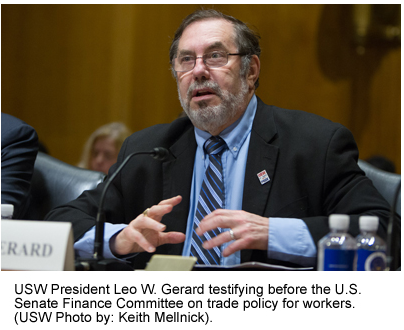Market Data

June 28, 2014
USW Gerard Urges Trade Enforcement
Written by Sandy Williams
“USW members and non-union workers alike know firsthand the pain inflicted by foreign predatory, protectionist and unfair trade practices,” said Leo W. Gerard, International President, United Steelworkers (USW) before the U.S. Senate Committee on Finance on June 25.
Gerard told Senate members that the only way the USW wins at its efforts to counter unfair trade is by losing. “Lost profits, lost jobs, closed factories, hollowed out communities – that is the price the trade laws demand to show sufficient injury to provide relief.”

Gerard said the government should more of a lead on efforts to protect US manufacturing. Some of the most successful efforts, he said, were because the USW initiated the case. “We’d vastly prefer that government do its job so our members can do their jobs,” said Gerard.
“Mr. Hatch,” said Gerard, “it might surprise you to hear me sing the praises of former President Ronald Reagan. But, on trade, and I emphasize, on trade he was one of our best Presidents. He made clear that America was interested in trading with other nations but that he would deal, resolutely, with cheating and predatory practices. . . .We need similar action today.”
The preliminary finding to exempt South Korea from dumping margins on OCTG was “flawed,” said Gerard. Because Korean OCTG is produced only for export, the Commerce Department chose a very low margin low-grade construction pipe for value comparison analysis. “Their decision is just plain wrong and needs to be altered to help restore fair prices to the market.”
Gerard also expounded on currency manipulation. “China is the worst culprit, but other nations are following their lead. China has been able to essentially subsidize its exports and tax imports into its market through currency cheating.”
The steps China is taking to bring is currency into balance leaves the currency “still dramatically undervalued,” said Gerard, and China uses it to “fuel its export-led growth strategy and limit imports into its market.”
“Some experts opine that asking China to do more will only destabilize its economy. Well, I’m sick and tired of American workers and domestic industries having to pay the price for China’s trade and economic policies. The time for talk is over. If the Administration won’t act, Congress must prioritize passing legislation to give private parties the power to seek relief from China’s currency manipulation, or that of any other country.
“Congress must not leave town for campaign season before passing this critical legislation,” said Gerard. “At election time, this Congress will be judged by our members on whether they stood by their sides, or continued to allow China and others to cheat them out of their jobs and their futures.”
Current trade policies are in “dramatic need of updating and reform,” said Gerard. “Trade enforcement is not a substitute for good trade policy.” Gerard suggested an action plan to improve enforcement of trade agreements.
1. Negotiate agreements that advance America’s interests.
2. Implement those agreements aggressively.
3. Monitor compliance.
4. Enforce provisions where our trading partners violate the rules.
“Implementation is key. That means preparing a comprehensive strategy to identify the commitments that our trading partners have made – multilaterally, plurilaterally, bilaterally or unilaterally – and keep them to their word.
“But, as noted, trade enforcement is dependent on the quality of the agreements that the Administration negotiates and the laws that are passed by Congress. A bad agreement, no matter how well it’s enforced, will yield negative results. Today’s policies have added to the decimation of America’s manufacturing base where more than 5 million workers are still out of work since 2000 and more than 60,000 factories have padlocked their gates. To be a strong country, to ensure a strong middle class, manufacturing is vital and trade policies are a critical element in the success, or demise, of our manufacturing sector.”







